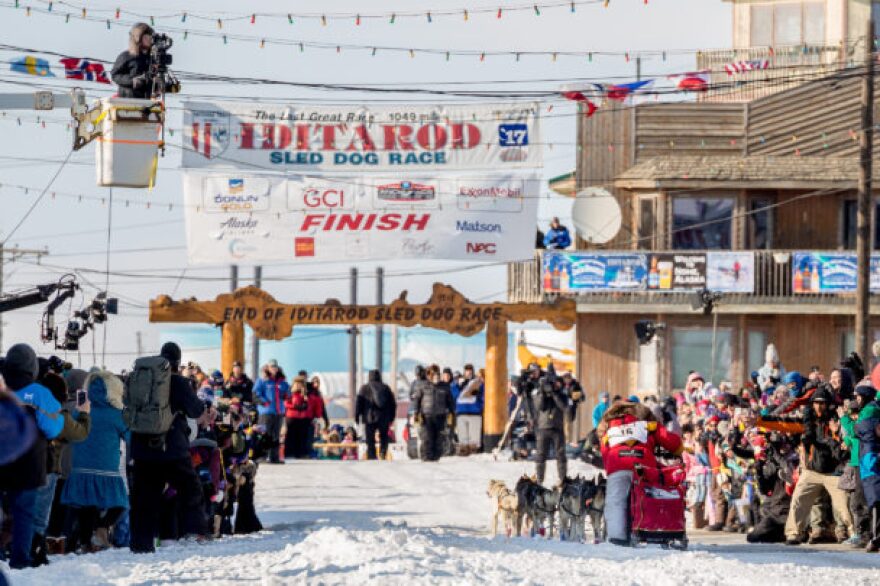There are some advantages to running an unfamiliar Iditarod route.
“I’m kind of a shoot-from-the-hips style of guy. So I kind of like that everybody’s having to think on their feet, cause I think that's my strong point out there," said Travis Beals, of Seward.
Beals is returning for his eighth year on the trail. He runs a kennel with his partner, Sarah Stokey — also an Iditarod veteran. Last year, he finished in 10th place.
But this year’s trail isn’t the one he’s used to. Instead of racing up to Nome and stopping in towns and villages along the way, teams are traveling just halfway up the traditional route, through the Alaska Range and Dalzell Gorge.
And then they’re turning around to do it all again.
“Normally, some of these challenging sections of the trail, we only hit once," he said. "And when we get through it, we can kind of take a breath and go, ‘Alright, we’re through that.’ Whereas this year, we’re going to turn around and go back through some of the sections that break sleds and cause a little bit of trouble.”
Iditarod officials changed the route to keep people in the surrounding villages safe — including Shaktoolik, which closed its checkpoint to racers last March as the arrival of the coronavirus intersected with the end of the Iditarod. Mushers will make checkpoints out of abandoned mining towns and other unpopulated areas on the route.
Iditarod champion Mitch Seavey, of Sterling, is inspired that the race is continuing against the odds. But he won’t be racing this year. It wasn’t about coronavirus.
“I just felt like I wanted a break," he said. "I wanted to see maybe what else is out there in the world beside the Iditarod. You know what I’m saying?”
This is Seavey’s first time not racing since 1994. He’s won three times and holds the fastest race time in Iditarod history.
When he won in 2017, he was the oldest musher to win, at 57.

Mitch Seavey’s son, Dallas Seavey, came in second that year. The two mushers have been neck and neck in several races.
Dallas Seavey, of Talkeetna, took a few years off from the race and is returning this year, with a team of both his own dogs and his dad’s dogs.
It’s a chance for the two mushers to work with each other, rather than against each other.
“When we’re both racing, we sort of keep all of our cards close to the vest because we know that each other is our biggest competitor," Mitch Seavey said. "And now that I’m not racing, we talk about things and share things and information that, boy, I wish I had known years ago how he was doing that.”
Hal Hanson, also of Sterling, has been working with the Seaveys for several years. He’s racing the Iditarod for the first time this March, fulfilling a dream he’s had since he was a kid in Oklahoma.
He’ll be running a “puppy team” of 2-year-old dogs.
“I’m most excited to see how these guys grow and mature," he said."What I’m probably most fearful of is turning around and coming back. Of all the experienced mushers, nobody’s ever done this before. Come back over the Alaska Range. Of anything, that will be what makes me nervous. Is just the unknown.”
Hanson ran with his team last weekend at the Copper Basin 300. He placed 20th.
He’s thrilled he’ll still get to race. For mushers on the peninsula, the starting and endpoint is just a drive away.
For last year’s champion, Thomas Waerner of Norway, it’s a flight overseas. Waerner said he won’t make a return this year since he can’t figure out how to get his dogs to Alaska amid the pandemic.
It’s going to be an Iditarod like no other. But for the 53 mushers signed up, from the experienced veterans to the rookies, there’s excitement in the novelty of it all.
“There’s part of me — I regret missing it," Mitch Seavey said. "It’s a unique race. It’s going to be fun for those guys, it’s going to be different.”
The 2021 Iditarod ceremonial start is March 6 in Anchorage, with the restart a day later at Deshka Landing.
Thanks to KNOM for the Iditarod 2017 soundbite.



